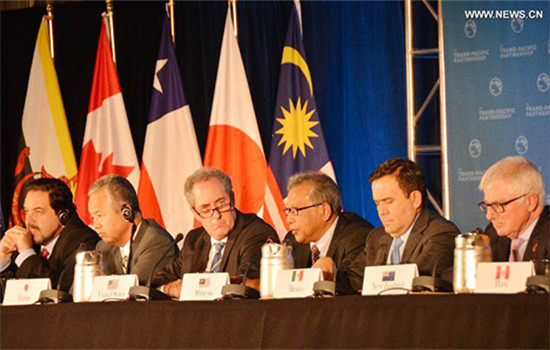
Trade ministers of the United States and 11 other Pacific Rim countries attend a press conference after negotiating the Trans-Pacific Partnership (TPP) trade agreement in Atlanta, the United States, on Oct. 5, 2015. (Photo/Xinhua)
Many Chinese commentators couldn't hide their elation at the announcement by U.S. President-elect Donald Trump that the very first executive action his administration would take is to withdraw from the Trans-Pacific Partnership Agreement, or TPP.
After all, it was seen as a downright insult that an alleged pan-Pacific business deal could exclude China, one of the largest global trading powers and perhaps today's greatest contributor to the overall economic growth of the world.
And the TPP is more of a political weapon than a real business deal, as the Barack Obama administration openly announced, it is intended to prevent China from writing future trade rules.
But Chinese companies should not thank Trump for abandoning the TPP because they are not part of the game, they should thank Obama for having not included their country into it in the first place, and for having prevented them from laboring to adapt to the rules that would only be overturned later.
The TPP was an excessively complex structure trying to include many things that are yet to be fully defined. Encumbering a trade arrangement with too many politics isn't the right way to do business.
Trade shouldn't be used as a weapon against an open and versatile trading nation either.
At the same time, it must be pointed out that the game in which China is allegedly writing rules, the Regional Comprehensive Economic Partnership or RCEP, was actually launched by the Association of Southeast Asian Nations. It was not of China's design that the United States is not part of it. Nor has China said it wants to close the door on the U.S..
China has had enough experience to understand, that would be highly impractical.
Moreover, China has recently expressed willingness to join the U.S. in a free trade agreement covering all Asia-Pacific nations, the Free Trade Area of the Asia-Pacific, which would bring about an integrated Asia-Pacific economy with greater openness.
So long as it is meant to be genuine real trade, China is happy to write the rules with all its partners.


















































